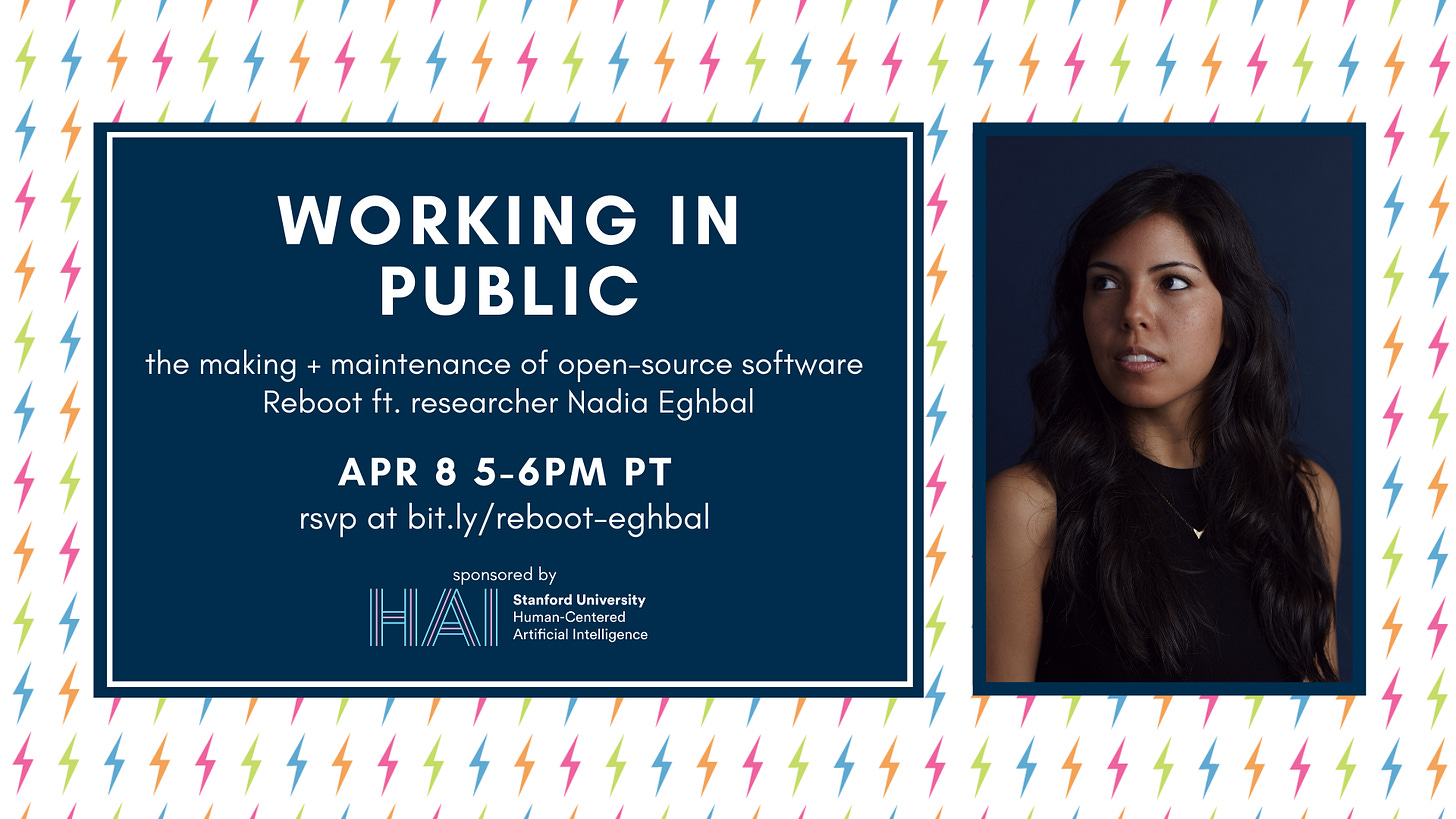⚡ New Event: Working in Public ft. Nadia Eghbal
What open source tells us about creator communities
Reboot is a publication and community for technologists charting a more conscious role in the world. We believe that tech is part of a system, and ‘good’ is an action, not a belief. If you share this mission, join us:
For many technologists, the open source movement embodies computing's post-capitalist, utopian dream. It’s information that is free to access and free to use; process that values peer-to-peer cooperation over corporate hierarchy; the sheer notion that many of the greatest feats in software might've been borne from pure goodwill and love of craft.
But behind that vague aspiration lives a large, complex community of open source contributors—a reality that is less polished, but far more interesting.
📖 working in public by nadia eghbal
In Working in Public: The Making and Maintenance of Open Source Software, researcher Nadia Eghbal breaks down the web of social and economic incentives that support online creators.
Eghbal first dove into the topic as an independent researcher, arguing that open source code is a form of public infrastructure, and then while working on developer experience at Github.
In our chat next Thursday, we'll talk about the theory versus reality of open source, its lessons for the broader creator economy, and what it’s like to be an independent researcher herself.
🔊 our take: influencers for infrastructure
By Ben Wolfson
The world runs on open source. Open source developers contribute untold (and largely uncompensated) value to the economy, from building the popular operating system Linux to small modules like the 17 lines of JavaScript that right-justify text. In the book Working in Public: The Making and Maintenance of Open Source Software, researcher Nadia Eghbal has produced an anthropological study on the history of open source communities and how their projects are motivated, regulated, governed, and grown—plus insights into where online communities are going next.
Working in Public follows up Eghbal's 2015 report “Roads and Bridges: The Unseen Labor Behind our Digital Infrastructure" to explore whether open source communities just need more coders to succeed. But Eghbal quickly learned that the quality of contribution matters more than quantity, and that the more interesting question is how developer communities are organized to ensure high-quality contributions. Focusing primarily on Github based communities and projects, Working in Public divides her answer into two parts: the first half asking "How People Make," and the second investigating "How People Maintain." Eghbal argues that while writing original code and creating new projects is the obvious part of development, maintaining that code ad infinitum is the more important part, even as it becomes Sisyphean in scale and scope.
I was fascinated by Eghbal’s classifications for how open source projects develop and are governed. She classifies projects as Federations, Stadiums, Clubs or Toys, and diverse power structures from democracy to dictatorship abound.
Eghbal then tracks the evolution of open source developers into something more closely resembling “content creators," with all the implications of the phrase. She reckons with the growing importance of reputation and attention in developer and project success—for instance, a project with a well-known developer will garner more maintainers and users compared to one without. Popularity contests translate into economic outcomes; many open source creators are now compensated through donation-based services like Patreon or simply hired by companies who rely on their work. What was originally sold as a utopian, communal project has transformed into one driven by singular prolific creators who now sustain entire products and platforms.
I am not a developer, open source or otherwise, and for me, Working in Public felt most like Tocqueville’s Democracy in America for the internet age. Both report on the dynamics of small communities within a greater whole: publicly-run projects whose communal aspects have changed drastically since their founding. While part of me wishes Eghbal had gone further in envisioning our future online world, by refraining, she has produced a book where speculation is largely absent and the information especially clear. Working in Public is an essential read for anybody who wants to learn about the code and communities that power our digital society, and for anybody curious about where that society may be going next.
🌀 microdoses
🛣️ The Ford Foundation, which published Eghbal's "Roads and Bridges" report, has allocated $1.3M to the research and implementation of equitable open source projects.
💞 Read this whimsical, interactive, GPT-3 assisted love story by the media geniuses at The Pudding.
🏰 In a Reboot guest essay, Jihad Esmail outlines a vision for post-capitalist entrepreneurship, from open source to worker coops.
🧠 Why AI doesn't always need to be explainable (because we love nuance).
🎨 This thread is what happens when the MoMA meets stats class
🗺️ Seeing Like A State
💝 closing note
The Reboot Student Fellows have heard from five awesome guest speakers, from tech founders to policymakers, so I asked the group to share some of the most valuable things they learned.
From Anh and Ivan on our chat with Casey Newton:
Anh (Fairleigh Dickinson University 2021): I read Casey’s work a lot, so I was interested in how he thinks a non-journalist can define an unique angle in their writing. His advice was that there's no substitute for doing a lot of reading and writing; to bring nuance by acknowledging all the relevant sides of the debate and all the trade-offs.
Ivan (Brown 2022.5): Seconding Anh, for me, writing has previously been about making the most impact or providing the "hottest take." But it's more similar to research, where each piece just adds small bricks onto a house.
Happy creating,
Jasmine & Reboot team







